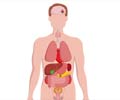A gene mutation in the brain can trigger irregular heart beat and sudden death in people with epilepsy, according to a new study.
The research published in The Journal of Neuroscience offers clues as to why people with epilepsy who are otherwise healthy are more than 10 times more likely than the general population to die suddenly and unexpectedly.The research may also help identify people who are at risk of sudden cardiac arrest and provide improved treatment.
Scientists led by Jeffrey Noebels of the Baylor College of Medicine focused on "abnormal ion channels" in the brain that cause epilepsy and also put individuals at risk for sudden unexplained death.
An ion channel is a protein that lets charged particles enter or leave a cell to generate electrical signals, a basic process of nerve cell communication.
Noebels and his colleagues found that these channels are also required for proper heart function.
Researchers discovered that mice without these channels show signs of severe epilepsy and involuntary movement, and die prematurely.
Advertisement
When the mice had epileptic seizures, their heart beats became even more erratic, suggesting the signals from their brains to their hearts were disordered. The mice soon died after several episodes of cardiac arrest.
Advertisement
Philip Schwartzkroin of the University of California at Davis, who studies epileptic seizures and was unaffiliated with the study, said this new finding could be of considerable significance and "provides insights that could lead to better treatments for at-risk patients."
Source-AFP
THK














